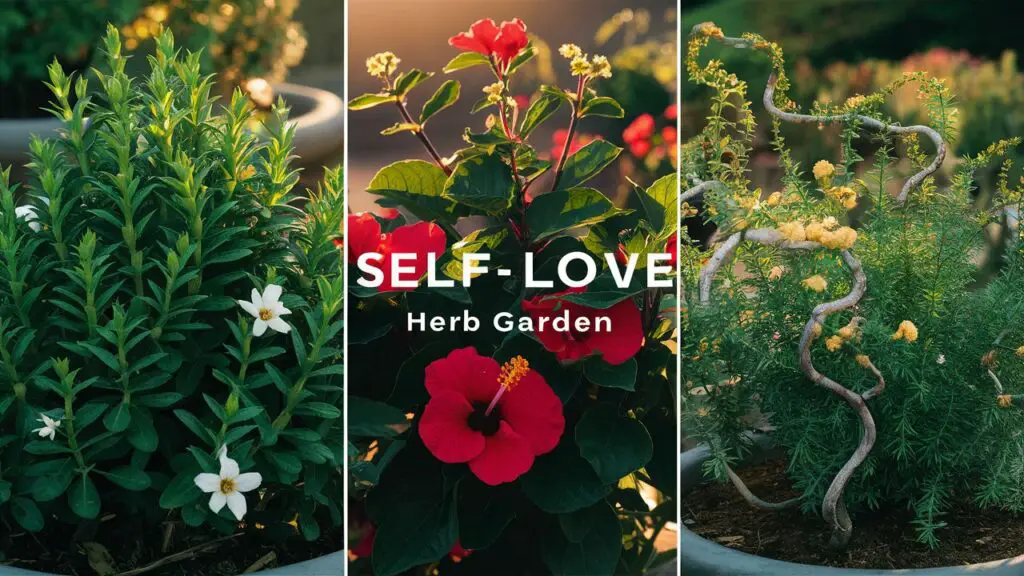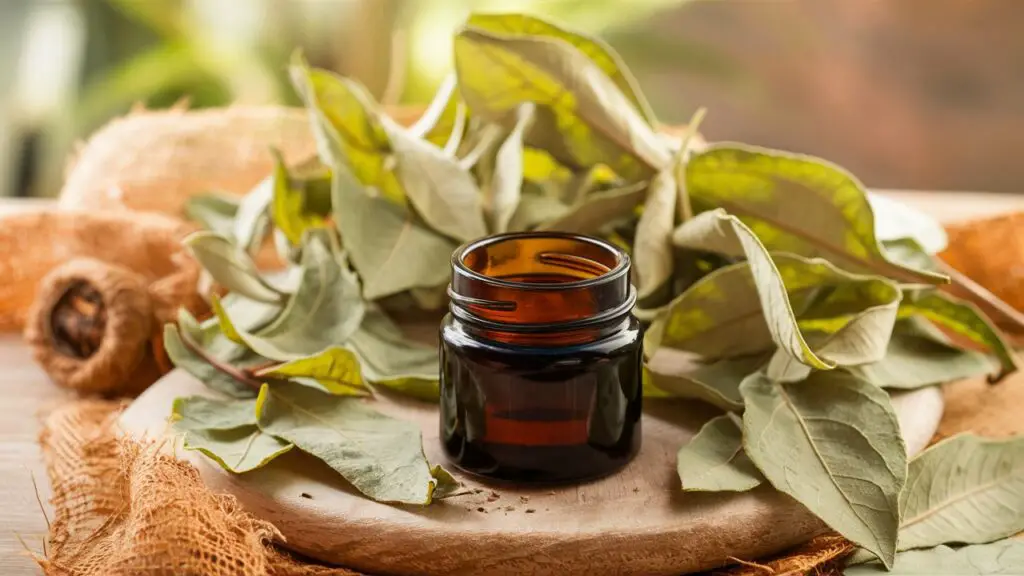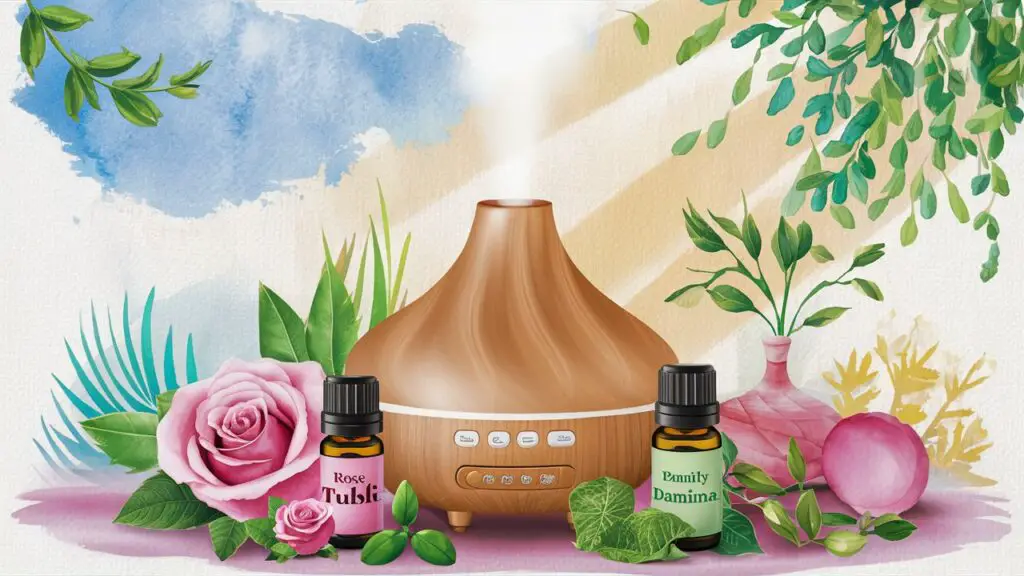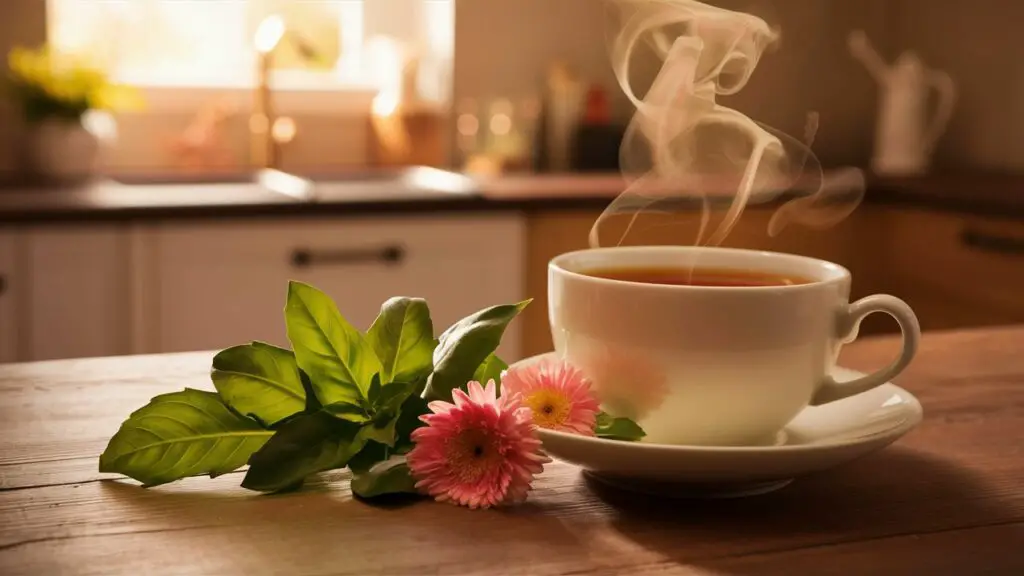5 Self-Love Herbs That Will Transform Your Routine

Self-love is the practice of valuing and caring for oneself. It plays a crucial role in nurturing our overall well-being, influencing everything from our mental health to our relationships. Embracing self-love can transform our lives, fostering resilience, happiness, and inner peace.
Incorporating herbs into your self-love routine can offer unique benefits. These self-love herbs possess properties that support emotional healing, calmness, pleasure, balance, and joy. Here’s a glimpse of five transformative herbs we’ll explore:
- Rose: Known for heart healing and promoting openness to love.
- Tulsi (Holy Basil): Helps find calm amidst chaos.
- Damiana: Enhances pleasure and sensuality.
- Reishi Mushroom: Nourishes the heart and promotes peaceful sleep.
- Hibiscus: Nurtures inner balance and joy.
In this article, we will delve into how these herbs work and their significance in self-love practices. We’ll also explore storytelling and personal experiences as powerful tools to deepen our connection with these herbs.
Do you have a specific interest in self-love herbs? Then use the table of contents below to jump to the most relevant section. And you can always go back by clicking on the black arrow in the right bottom corner of the page. Also, please note that some of the links in this article may be affiliate links. For more details, check the Disclosure section at the bottom of the page.
Here's what we'll cover:
- The Power of Self-Love
- Using Herbs as Tools for Self-Love
- 1. Rose: Cultivating Heart Healing and Openness to Love
- 2. Tulsi (Holy Basil): Finding Calm Amidst the Chaos
- 3. Damiana: Embracing Pleasure and Sensuality
- 4. Hibiscus: Nurturing Inner Balance and Joy
- 5. Reishi Mushroom: Deepening Self-Connection Through Restful Sleep
- Enhancing Your Self-Love Journey Through Herbal Rituals
- Embrace the Journey: Nurturing Self-Love with the Help of Nature
The Power of Self-Love
Years ago, I struggled with self-love. Constantly criticizing myself and doubting my abilities left me feeling emotionally drained and disconnected. This lack of kindness towards myself had a negative impact on my mental health, causing me to experience anxiety and always feeling like I wasn’t good enough.
Research shows how important self-love is in increasing overall happiness and resilience. Studies indicate that developing self-love can result in better emotional healing, higher motivation, and improved mental well-being. Experts such as Dr. Kristin Neff emphasize that being compassionate towards ourselves is crucial for dealing with life’s challenges.
Tangible Benefits of Embracing Self-Love
- Improved Relationships: When you have love for yourself, it becomes easier to establish healthy relationships. Having self-respect sets the groundwork for mutual respect in your interactions with others.
- Increased Motivation: Embracing self-love helps you stay motivated and determined. Acknowledging your value encourages you to pursue your goals with certainty.
- Enhanced Emotional Well-being: Practicing self-love nurtures emotional stability, lessening feelings of unease and sadness.
Recognizing the significance of self-love changes how we engage with the world, creating a positive impact that enhances different areas of our lives.

Using Herbs as Tools for Self-Love
Herbs are a natural and holistic way to support both your emotional and physical well-being. They can help with issues like stress, anxiety, and even low libido, bringing your body back into balance. Each herb has its own unique properties that can be used as a tool for practicing self-love.
The Wisdom of Traditional Herbal Medicine
Herbal medicine has been used for centuries in different cultures around the world. It is rooted in ancient traditions that recognized the power of plants for healing. Even today, we can learn from these traditional practices:
- Traditional Chinese Medicine: This approach focuses on restoring harmony between the body’s energy systems. Herbal remedies are used alongside acupuncture, massage, and other therapies.
- Ayurveda: Originating from India, Ayurvedic medicine emphasizes the balance between mind, body, and spirit. Herbs are prescribed based on an individual’s unique constitution.
- Native American Herbalism: Indigenous communities have long relied on plants for both physical and spiritual healing. Their herbal practices honor the connection between nature and humanity.
These ancient traditions teach us that herbs can be used not only for physical ailments but also to strengthen our emotional resilience and support our spiritual growth.
Bringing Herbal Practices into Your Life
Incorporating these time-honored practices into our modern routines allows us to access a wealth of natural healing knowledge. Whether it’s through drinking herbal teas, using herbal tinctures, or enjoying the aromatherapy benefits of essential oils, engaging with herbs can become a meaningful part of our self-care journey.
The beauty of using herbs lies in their holistic approach to well-being. By addressing multiple aspects of our health at once – body, mind, and spirit – we can experience more comprehensive healing.
Understanding the historical context and diverse applications of herbal remedies enriches your connection with these plants. It transforms simple self-care rituals into profound acts of self-love and personal growth.

Imagine sipping a soothing tulsi tea while reflecting on how this sacred herb has been revered in Ayurvedic traditions for centuries. The story enriches your experience, allowing you to appreciate tulsi’s adaptogenic properties that help manage stress and promote mental clarity. You’re not just drinking tea; you’re partaking in a ritual that generations before you have found solace in.
Rose, often called the herb of love, can be even more transformative when you associate it with stories of heart healing and compassion. A fictional narrative or personal anecdote about rose’s ability to mend emotional wounds makes its inclusion in your daily self-love practice much more meaningful.
Crafting these stories helps you internalize the benefits of these herbs, such as hibiscus for reducing stress or damiana for embracing sensuality. These narratives make each herb a character in your journey toward self-love, enhancing their impact on your emotional and physical well-being.
Discovering herbs for enhancing self-love goes beyond their medicinal properties; it involves embracing the rich tapestry of stories they bring into your life. For instance, learning about the history of Ayurveda and its reverence for herbs like tulsi can add depth to your practices. Exploring resources like 16th International Herb Symposium Proceedings can provide a wealth of knowledge on the subject.
This storytelling aspect elevates your routine from mundane to magical, creating a deeper sense of connection and purpose. So, why not explore plant-inspired self-love practices or delve into the role of herbs for the chakras as you embark on this journey of self-discovery?
1. Rose: Cultivating Heart Healing and Openness to Love
Imagine a time when the weight of the world feels especially heavy, and emotional wounds seem impossible to mend. During such a period, I discovered the transformative power of rose, often hailed as the herb of love. Drinking rose-infused tea became a daily habit that slowly nurtured my heart and encouraged greater self-compassion.
Specific Benefits of Rose for Self-Love
Rose is well-known for its ability to:
- Soothe Emotional Wounds: The gentle yet powerful nature of rose helps in easing emotional pain, making it one of the most effective heart healthy herbs.
- Enhance Intimacy: By opening up the heart chakra, rose allows us to connect more deeply with ourselves and others.
- Promote Self-Compassion: The calming and nurturing properties of rose petals encourage a sense of self-worth and acceptance.
Incorporating Rose into Daily Rituals
Integrating rose into your routine can be both simple and enjoyable. Here are some creative ideas to get you started:
- Heart-Opening Tea Blend: Combine dried rose petals with other calming herbs like chamomile or lavender to create a soothing tea that promotes emotional healing.
- Self-Massage with Rose-Infused Oil: Create a luxurious massage oil by infusing rose petals in a carrier oil like jojoba or almond (here’s a recipe that includes vanilla for added relaxation). Use this oil for a gentle self-massage, focusing on areas where you hold tension or emotional stress.
- Bath Rituals: Add fresh or dried rose petals to your bathwater along with Epsom salts and a few drops of rose essential oil. This creates a relaxing and heart-nourishing experience (learn more about rose oil).
- Aromatherapy: Utilize rose essential oil in a diffuser to fill your space with its uplifting aroma, helping to balance emotions and foster an environment of self-love.
By incorporating these practices into your daily life, you harness the powerful properties of rose, allowing it to guide you towards greater emotional healing and openness to love.

2. Tulsi (Holy Basil): Finding Calm Amidst the Chaos
During one of my most stressful periods, I discovered the calming effects of Tulsi. Balancing work deadlines, family commitments, and personal projects had left me feeling overwhelmed. A friend recommended brewing a cup of Tulsi tea to help anchor myself in the present moment. As I sipped the warm, aromatic tea, I felt a sense of calm wash over me, allowing me to embrace self-acceptance amidst the chaos.
The adaptogenic properties of Tulsi make it an invaluable ally for anxiety relief and mental clarity. Adaptogens are natural substances that help the body adapt to stress and exert a normalizing effect upon bodily processes. Tulsi, known as “Holy Basil,” has been revered in Ayurvedic medicine for centuries due to its numerous health benefits:
- Reduces Stress and Anxiety: Tulsi helps lower cortisol levels, the hormone responsible for stress.
- Enhances Mental Clarity: Regular consumption can improve cognitive functions like memory and focus.
- Promotes Emotional Balance: Its soothing properties foster a sense of emotional stability.
Incorporating Tulsi into your daily routine can be both simple and effective:
- Brewing a Soothing Tea: Start by steeping fresh or dried Tulsi leaves in hot water for about 10 minutes. Enjoy this tea during moments of stress or as part of your daily ritual.
“The act of making and drinking Tulsi tea became a meditative practice for me, providing moments of tranquility in my busy day.”
- Mindful Meditation with Tulsi Essential Oil: Diffuse Tulsi essential oil during meditation sessions to enhance relaxation and focus. You can also apply a few diluted drops on your wrists or behind your ears.
- Culinary Uses: Add fresh Tulsi leaves to your meals. This not only enhances flavor but also integrates its calming benefits into your diet.
Embracing the holistic nature of herbs like Tulsi enriches self-love practices, offering both physical and emotional nourishment. The rich history and cultural significance of this herb highlight its timeless wisdom in promoting well-being and resilience.

3. Damiana: Embracing Pleasure and Sensuality
A close friend once shared a transformative experience with me: after years of feeling disconnected and self-conscious about her body, she discovered the sensual qualities of Damiana. This powerful herb, known for its pleasure enhancement and aphrodisiac properties, helped her rediscover joy and body confidence. By embracing Damiana, she found a renewed sense of vitality that permeated all aspects of her life.
Overcoming Shame and Past Traumas
Damiana plays a crucial role in helping us overcome shame or past traumas. It reconnects us with our innate sense of pleasure, allowing us to fully embrace our body’s natural rhythms. When used thoughtfully, Damiana can:
- Enhance sensory experiences
- Promote feelings of relaxation and pleasure
- Reignite passion and intimacy
This herb’s ability to foster a deep connection with oneself makes it an invaluable tool for those on a journey toward self-love.
Incorporating Damiana into Intimate Rituals
You can easily integrate Damiana into your self-love routines. Here are some creative ideas:
1. Luxurious Bath with Damiana-Infused Salts
- Add dried Damiana leaves to your bath salts.
- Soak in the aromatic blend to relax your muscles and invigorate your senses.
2. Self-Love Massage with Damiana Essential Oil
- Mix a few drops of Damiana essential oil with a carrier oil like coconut or jojoba.
- Use this blend for a soothing self-massage, focusing on areas where you hold tension.
3. Aromatic Diffusion
- Diffuse Damiana essential oil during meditation or yoga sessions.
- The scent can help center your mind and elevate your mood.
Embracing the sensual qualities of Damiana enriches not just your physical well-being but also fosters emotional healing and resilience. This herb’s multifaceted benefits make it a powerful ally in cultivating self-love and enhancing overall well-being.
Exploring these practices allows you to create intimate rituals that honor both your body and spirit, inviting more pleasure and positivity into everyday life.

4. Hibiscus: Nurturing Inner Balance and Joy
One afternoon, after a particularly tiring day at work, I found myself reaching for a cup of hibiscus tea. The bright red color immediately calmed me down, and as I took my first sip, I felt a wave of peace. This simple act became a moment of comfort and calmness, giving me an unexpected but much-needed break from the pressures of the day.
Reducing Stress and Cultivating Positivity
Hibiscus is known for its ability to help reduce stress and promote emotional well-being. Its natural compounds, such as antioxidants and vitamins, play an important role in helping our bodies handle stress better. The vibrant color of hibiscus also adds to its uplifting properties, making it a great choice for those who want to develop a positive mindset.
- Antioxidants: These help fight oxidative stress in the body, which can lower anxiety levels.
- Vitamins: Essential nutrients that support overall health and contribute to clear thinking.
Simple yet Meaningful Self-Care Ideas
Adding hibiscus to your self-care routine can be easy and enjoyable. Here are some ideas to inspire you:
- Gratitude Journaling: Combine your journaling practice with a warm cup of hibiscus tea. Writing down things you’re grateful for while savoring this calming drink can create a special ritual for nurturing inner balance.
- Hibiscus Bath: Drop dried hibiscus petals into your bathwater for a luxurious soak that not only eases your muscles but also surrounds you with the herb’s soothing properties.
- DIY Skincare: Make a face mask using hibiscus powder mixed with yogurt or honey. This not only benefits your skin but also gives you an opportunity to focus on self-love and care.
Boosting Emotional Well-Being

Making hibiscus a regular part of your life can greatly improve your emotional well-being by:
- Helping you relax with its calming effects
- Supporting healthy blood pressure levels, which are often associated with lower stress
- Encouraging mindfulness when incorporated into daily routines
By exploring these approaches, you’ll be able to fully enjoy the many advantages of hibiscus. Whether it’s through a cup of tea or a pampering bath, finding ways to include this plant in your self-care practices can have a noticeable impact on your day-to-day emotional health.
Additional Resources for Holistic Well-Being
If you’re interested in further exploring the transformative power of natural habits and achieving holistic well-being, I recommend delving into resources like “THE POWER OF 100: Transforming Your Life with Healthy Habits” and understanding how herbs can align with your chakras, as explained in this insightful article on “Herbs for the Chakras“. These additional resources can provide valuable insights and support on your journey towards nurturing inner balance and joy.
5. Reishi Mushroom: Deepening Self-Connection Through Restful Sleep
I discovered the profound wisdom of Reishi during a personal retreat, where it revealed its power in promoting inner harmony and self-awareness. Known as the “mushroom of immortality,” Reishi is highly regarded for its ability to nourish the heart and facilitate peaceful sleep, making it an excellent companion for self-love practices.

How Reishi Supports Better Sleep and Stress Management
Reishi’s adaptogenic properties play a crucial role in stress management and maintaining healthy sleep patterns. It has earned its reputation as a “spiritual ally” due to its capacity to help the body adapt to different stressors, bringing balance to both physical and emotional states. This adaptability makes Reishi an indispensable herb for anyone seeking profound self-connection and rejuvenating rest.
Ways to Incorporate Reishi Into Your Routine
There are various ways you can include Reishi in your daily life:
- Dual-extracted tinctures: These concentrated liquid extracts provide a potent method of consuming Reishi, capturing both water-soluble and alcohol-soluble compounds.
- Decadent hot chocolate blends with Reishi powder: By combining Reishi powder with cocoa, you can create a soothing and delightful beverage that doubles as an evening ritual.
These approaches not only make it convenient to experience the benefits of Reishi but also introduce a touch of luxury into your self-care practices.
Enhancing Your Self-Love Journey Through Herbal Rituals
Creating personalized self-love rituals with herbs offers a unique way to connect with yourself on a deeper level. Integrating herbal teas, salt baths, and essential oils into your routine can transform ordinary moments into sacred self-care practices.
Creating Your Own Self-Love Rituals
Personalized rituals begin with intention setting. Choose a quiet space where you feel safe and comfortable. Spend a few moments reflecting on what you need—be it healing, calm, or joy. This helps in selecting the right herbs for your ritual.
Herbal Teas
Herbal teas are a simple yet powerful way to incorporate the benefits of self-love herbs into your daily life.
- Rose Tea: Brewed from dried rose petals, this tea helps open the heart and soothe emotional wounds.
- Tulsi Tea: Known for its adaptogenic properties, Tulsi tea can calm the mind and anchor you in the present moment.
- Hibiscus Tea: A vibrant choice that reduces stress and cultivates joy through its rich antioxidant content.
Aromatic Baths
Salt baths infused with herbs offer another layer of nurturing self-care.
- Rose Petal Bath: Add dried rose petals and a few drops of rose essential oil to your bathwater for an immersive heart-healing experience.
- Damiana-Infused Bath Salts: Mix Epsom salts with dried Damiana leaves and a couple of drops of Damiana essential oil to create a luxurious, sensual bath that reconnects you with pleasure.
- Hibiscus Salt Bath: Combine sea salt with dried hibiscus flowers to create a soothing soak that promotes inner balance.
Essential Oils
Essential oils are versatile tools for enhancing your self-love rituals through aromatherapy.
- Rose Oil: Use in diffusers or apply diluted rose oil on pulse points during meditation to foster self-compassion.
- Tulsi Oil: Inhale directly from the bottle or add a few drops to your diffuser to manage anxiety and increase mental clarity.
- Damiana Oil: Perfect for intimate massages, this oil can enhance your connection with your body and boost confidence.
Setting Intentions
Setting intentions is crucial when engaging in herbal rituals. Before starting, take deep breaths and focus on what you wish to achieve. Whether it’s healing emotional wounds, finding calm amidst chaos, or embracing pleasure, clearly defined intentions empower the herbs’ natural abilities to support you.

Cultivating a Nurturing Environment
The environment plays a pivotal role in how effective these rituals can be:
- Create a tranquil space free from distractions.
- Use soft lighting such as candles or fairy lights.
- Play soothing music that resonates with your mood or use silence if it feels more comforting.
Integrating these elements ensures that your self-love rituals become meaningful practices that nourish both body and soul.
Embrace the Journey: Nurturing Self-Love with the Help of Nature
The path to self-love is not always straightforward. You may encounter obstacles like self-doubt and anxiety along the way, and it’s crucial to acknowledge these challenges. Remember that it’s normal to face hurdles, but every step you take towards overcoming them brings you closer to a deeper sense of well-being.
How Herbs Can Help
Exploring the herbal allies discussed can support you in overcoming these challenges:
- Rose for heart healing
- Tulsi for calm and clarity
- Damiana for pleasure and vitality
- Hibiscus for inner balance
These herbs offer natural anxiety relief and help you establish a stronger connection with your inner self. While they provide significant benefits, it’s equally important to seek professional help when necessary.
Thanks for the blog graphics: Canva.com
Disclosure: At Buddhatooth.com we only mention the products that we’ve researched and considered worthy. But it’s important to note that we are a participant of several affiliate programs, including but not limited to VigLink and Amazon Services LLC Associates Program, an affiliate advertising program designed to provide a mean for us to earn fees by linking to Amazon.com and affiliated sites. As an Amazon Associate Buddhatooth.com earns from qualifying purchases.

